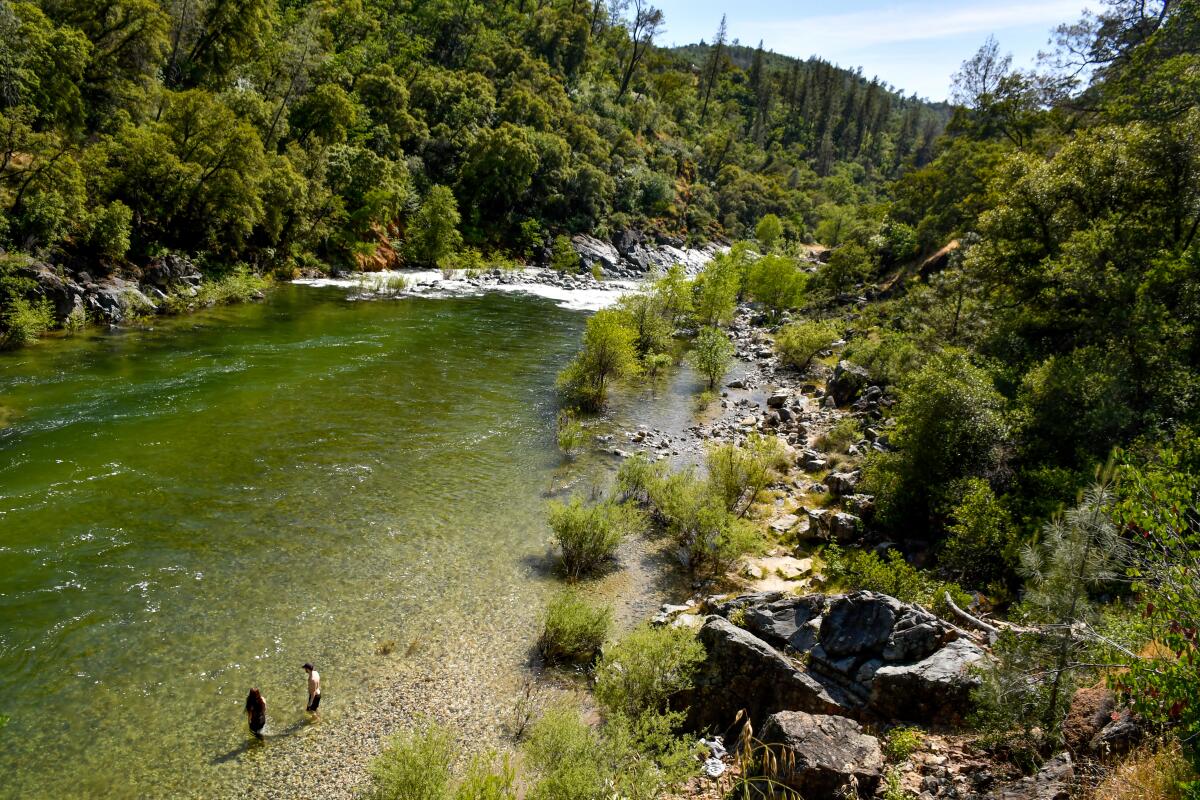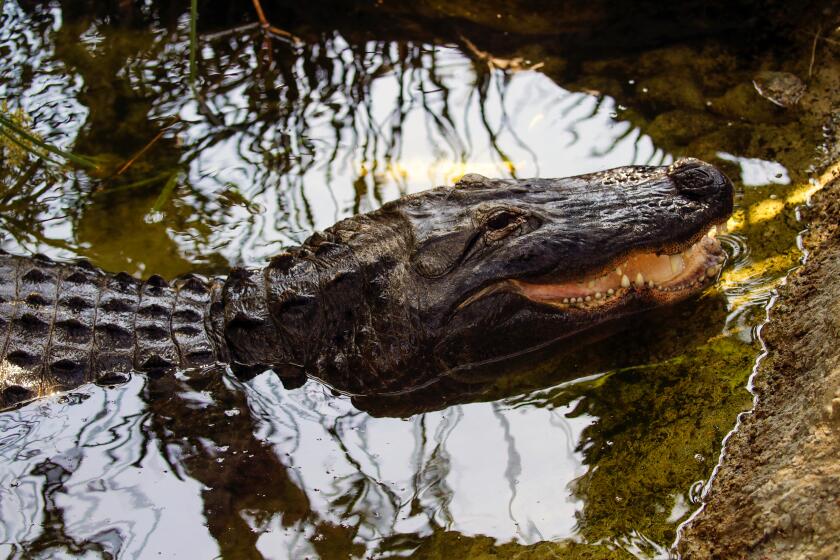New research says humans learned to speak partly because babies are too hard to take care of alone

- Share via
Earlier this week, while we were all busy with the (now paused) war in Iran and the (very much ongoing) court battle over soldiers in L.A. streets, my baby started saying my name.
It’s a moment every mother waits for — particularly those among us who are aggrieved that our offspring decide to learn “baba” or “dada” or “papa” first. My own infant has been saying “abba” for almost two months. But this week, for the first time, he started saying “ima” — not EEE-ma as my older children howl it, but i-mAH, i-mAH, i-mAH, like a tiny body builder huffing through a dead lift.
You're reading the Essential California newsletter
Our reporters guide you through the most important news, features and recommendations of the day.
You may occasionally receive promotional content from the Los Angeles Times.
Then, in typical Leo fashion, he clapped for himself.
Like all babies, my youngest son learned this through arduous repetition. You may have seen the fascinating paper in Science Advances this week (discussed in the New York Times) analyzing “infant-directed communication” — i.e., baby talk — in primates.
That paper concludes that we talk “orders of magnitude” more to our babies than our ape cousins do, and hypothesizes that this habit likely played a “critical role in the emergence of human language.”
In her forthcoming book, “The Origin of Language,” evolutionary biologist Madeleine Beekman argues the genetic fluke that left our ancestors with huge brains and vocal apparatus capable of complex sound also forced us to give birth to infants so radically “premature” that we’d have gone extinct trying to care for them as independently as other social primates do. To survive, we had to learn to yap.
I spoke to Beekman about her book. Our conversation has been edited for length and clarity.
I’ve read other language origin stories, including Yuval Noah Harari’s ”Sapiens” and a bit of Noam Chomsky’s ”Language and Mind.” Where do you diverge?
They all have examples of why language is important once you have it, but no one explains how we got it.
Your explanation really begins with Lucy, the first of our ancestors who could not give birth unassisted and would have had a more difficult early motherhood than modern great apes. That pushed our social evolution. What’s the next big leap?
There’s a particular gene that we call a pseudogene because it stopped functioning [in other closely related primates]. In our species, for some reason, it got repaired and started to copy itself. That led to this ballooning brain. It also changed our throat, so we are now able to make sounds that are able to be molded into a language.
[Now] babies needed to be born much earlier, way before their brain was developed.
[Many scientists now believe it’s this energetic cost of building our brains, not the “obstetric dilemma” between big head and narrow pelvis, that determines when humans give birth.]
They’re born with extremely neuroplastic brains — they’re basically sponges for information, and they needed to be such responsive and quick learners because they basically had to manipulate the individuals around them to take care of them.
The baby brain is a great gateway for language to be transferred from brain to brain. All the main connections in the brain still have to be formed, and that all happens in a social context, because it all happens outside of the womb.
We are extremely social because language allowed us to be extremely social.
So the problem of child care forced us to learn to talk to each other?
People have done calculations that show for a hunter-gatherer child, it takes 15 years before she’s able to gather enough nutrients to sustain herself. For 15 years, she’s dependent on other individuals.
Women in the western world have been indoctrinated that you are the most important individual for your child. Of course you are, but you’re not the only important individual for your child, and the more loving individuals you have around your child the better it is for them.
The week’s biggest stories

Newsom sues Fox News for defamation
- The lawsuit stems from comments President Trump made about a phone call with Gov. Newsom.
- The governor’s demand for $787 million in punitive damages places him at the forefront of the political proxy war between Democrats and Republicans over the press.
Immigration raids and protests
- Four masked, plainclothes agents pushed a protester to the pavement and piled on top of him against a curb as he struggled to breathe.
- Multiple people on the crowded downtown L.A. street captured the moment on video.
- Increasingly aggressive immigration raids carried out by masked federal agents, sometimes using unmarked vehicles, are creating problems for local law enforcement agencies.
Measles on the rise in California
- California has already reported more measles cases this year than in all of 2024. The nation is suffering its largest outbreak of the super-infectious disease in decades.
- The virus is spreading almost universally among people who either haven’t been vaccinated, authorities noted.
Sudden storm left 8 boaters dead
- 37-year-old DoorDash executive and new dad Josh Pickles was among the eight who died after their boat capsized on Lake Tahoe during a sudden storm.
- The other boaters who died were all friends or relatives of Pickles. They had gathered in Tahoe to celebrate his mother’s 71st birthday, a family spokesperson said.
The world’s largest wildlife crossing
- Work on a wildlife tunnel is expected to close Agoura Road during the day for several months starting in August.
- The new tunnel will be part of the Wallis Annenberg Wildlife Crossing, the largest wildlife crossing in the world.
Costly Fourth of July barbecues in California
- Fireworks aren’t the only thing accompanying Californians’ Fourth of July celebrations this year — higher grocery prices will as well.
- Chicken breasts run an average of $12.48 for two pounds in California versus $7.79 nationally, while three pounds of pork chops cost $19.30 here, compared with $14.13 nationwide.
More big stories
- ICE seized a 6-year-old with cancer outside an L.A. court; his mom is fighting for his release.
- The Supreme Court has limited judges’ ability to block Trump’s birthright citizenship ban.
- California officials must rewrite state policy as the Supreme Court allows parents to “opt out” of LGBTQ+ school stories.
- A San Fernando music shop featured in 1992’s “Wayne’s World” closed after nearly 78 years.
- In a landmark decision, a judge ruled California FAIR Plan’s smoke-damage policy is illegal.
- These two L.A. restaurants are the city’s first-ever to receive three Michelin stars.
- The Palisades reservoir that was empty “on the one day in history it was needed most” is back online.
- LACMA opens its new building for a sneak peak: Here are photos from the first preview.
This week’s must reads
Scammers stole more than $10 million in financial aid last year by fraudulently enrolling in California’s community colleges. State and federal officials are working to combat the rising fraud.
More great reads
- Malaysia will stop accepting U.S. plastic waste, creating a dilemma for California.
- Parents, chill: You don’t need to teach your 3-year-old to read.
- Evicted from her apartment at 68, an artist starts anew in a sunny L.A. fourplex.
- A groundbreaking wine bar to close this summer because “continuing felt untenable.”
For your weekend
Going out
- Travel: It’s time to escape to California’s Gold Rush towns for postcard charms and swimming holes.
- Restaurants: Stylish new restaurant Lucia brings Afro-Caribbean comfort classics to fine-dining heights along Fairfax Avenue.
- Museums: “Girlfriends” celebrates its 25-year anniversary with a free art exhibit in L.A.
Staying in
- Documentaries: In “My Mom Jayne,” Mariska Hargitay grapples with a secret and her mother’s choices.
- Music: The 25 best songs of 2025 so far.
- Books: Guns N’ Roses’ former manager recalls harrowing stories and calls Mötley Crüe “brutish entertainers” in a new book, “Sound N’ Fury: Rock N’ Roll Stories.”
- Recipes: Here’s a recipe for mixed berry pie with cinnamon crumble topping.
- ✏️ Get our free daily crossword puzzle, sudoku, word search and arcade games.
L.A. Timeless
A selection of the very best reads from The Times’ 143-year archive.
Once upon a time — before P-22 or Grumpy Cat — a rogue gator lurked in an L.A. lake. Where is he now?
Have a great weekend, from the Essential California team
Kevinisha Walker, multiplatform editor
Karim Doumar, head of newsletters
How can we make this newsletter more useful? Send comments to essentialcalifornia@latimes.com. Check our top stories, topics and the latest articles on latimes.com.
Sign up for Essential California
The most important California stories and recommendations in your inbox every morning.
You may occasionally receive promotional content from the Los Angeles Times.










